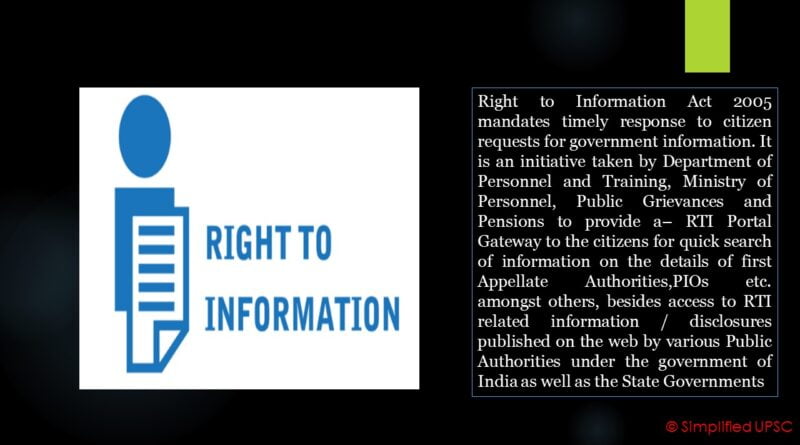Right to Information Act
Department of Personnel and Training, Ministry of Personnel, Public Grievances and Pensions
Context:
The Supreme Court has criticised the Union government for having not filed a reply to a petition by parliamentarian Jairam Ramesh challenging the amendments made to the Right to Information Act for over a year.
What’s the issue?
The petitioner argues that the amendments gave the Centre unparalleled powers to dictate the tenure, salaries and service conditions of the Chief Information Commissioner and Information Commissioners as per its “whims and fancies”.
- The petitioner contended that the RTI Amendment Act of 2019 and its Rules cripple the objectivity and independence of the Central Information Commission (CIC) by bringing under the yoke of the government.
Historical Background
- The right to information gained power when Universal Declaration of Human Rights was adopted in 1948 providing everyone the right to seek, receive, information and ideas through any media and regardless of frontiers.
- The International Covenant on Civil and Political rights 1966 states that everyone shall have the right to freedom of expression, the freedom to seek and impart information and ideas of all kinds.
- According to Thomas Jefferson “Information is the currency of democracy,” and critical to the emergence and development of a vibrant civil society. However, with a view to set out a practical regime for the citizens to secure information as a matter of right, the Indian Parliament enacted the Right to Information Act, 2005.
- Genesis of RTI law started in 1986, through judgement of Supreme Court in Mr. Kulwal v/s Jaipur Municipal Corporation case, in which it directed that freedom of speech and expression provided under Article 19 of the Constitution clearly implies Right to Information, as without information the freedom of speech and expression cannot be fully used by the citizens.
What type of information can be requested through RTI?
The citizens can seek any information from the government authorities that the government can disclose to the parliament.
Some information that can affect the sovereignty and the integrity of India is exempted from the purview of RTI.
Information relating to internal security, relations with foreign countries, intellectual property rights (IPR), cabinet discussions are exempted from RTI.
Objective of the Right to Information Act :
The basic object of the Right to Information Act is to empower the citizens,promote transparency and accountability in the working of the Government,contain corruption, and make our democracy work for the people in real sense.It goes without saying that an informed citizen is better equipped to keep necessary vigil on the instruments of governance and make the government more accountable to the governed.The Act is a big step towards making the citizens informed about the activities of the Government.
What does RTI Act do?
Under the RTI Act, 2005, Public Authorities are required to make disclosures on various aspects of their structure and functioning. This includes:
- disclosure on their organisation, functions, and structure,
- powers and duties of its officers and employees, and
- financial information.
The intent of such suo moto disclosures is that the public should need minimum recourse through the Act to obtain such information. If such information is not made available, citizens have the right to request for it from the Authorities. This may include information in the form of documents, files, or electronic records under the control of the Public Authority. The intent behind the enactment of the Act is to promote transparency and accountability in the working of Public Authorities.
Who is included in the ambit of ‘Public Authorities’?
‘Public Authorities’ include bodies of self-government established under the Constitution, or under any law or government notification. For instance, these include Ministries, public sector undertakings, and regulators. It also includes any entities owned, controlled or substantially financed and non-government organizations substantially financed directly or indirectly by funds provided by the government.
How is the right to information enforced under the Act?
The Act has established a three tier structure for enforcing the right to information guaranteed under the Act.
Public Authorities designate some of their officers as Public Information Officers. The first request for information goes to Central/State Assistant Public Information Officer and Central/State Public Information Officer, designated by the Public Authorities. These Officers are required to provide information to an RTI applicant within 30 days of the request. Appeals from their decisions go to an Appellate Authority. Appeals against the order of the Appellate Authority go to the State Information Commission or the Central Information Commission. These Information Commissions consists of a Chief Information Commissioner, and up to 10 Information Commissioners.
What does the Right to Information (Amendment) Bill, 2019 propose?
The Bill changes the terms and conditions of service of the CIC and Information Commissioners at the centre and in states. Table 1 below compares the provisions of the Act and the Bill.
Table 1: Comparison of the provisions of the Right to Information Act, 2005 and the Right to Information (Amendment) Bill, 2019
| Provision | RTI Act, 2005 | RTI (Amendment) Bill, 2019 |
| Term | The Chief Information Commissioner (CIC) and Information Commissioners (ICs) (at the central and state level) will hold office for a term of five years. | The Bill removes this provision and states that the central government will notify the term of office for the CIC and the ICs. |
| Quantum of Salary | The salary of the CIC and ICs (at the central level) will be equivalent to the salary paid to the Chief Election Commissioner and Election Commissioners, respectively. Similarly, the salary of the CIC and ICs (at the state level) will be equivalent to the salary paid to the Election Commissioners and the Chief Secretary to the state government, respectively. | The Bill removes these provisions and states that the salaries, allowances, and other terms and conditions of service of the central and state CIC and ICs will be determined by the central government. |
| Deductions in Salary | The Act states that at the time of the appointment of the CIC and ICs (at the central and state level), if they are receiving pension or any other retirement benefits for previous government service, their salaries will be reduced by an amount equal to the pension. Previous government service includes service under: (i) the central government, (ii) state government, (iii) corporation established under a central or state law, and (iv) company owned or controlled by the central or state government. | The Bill removes these provisions. |



